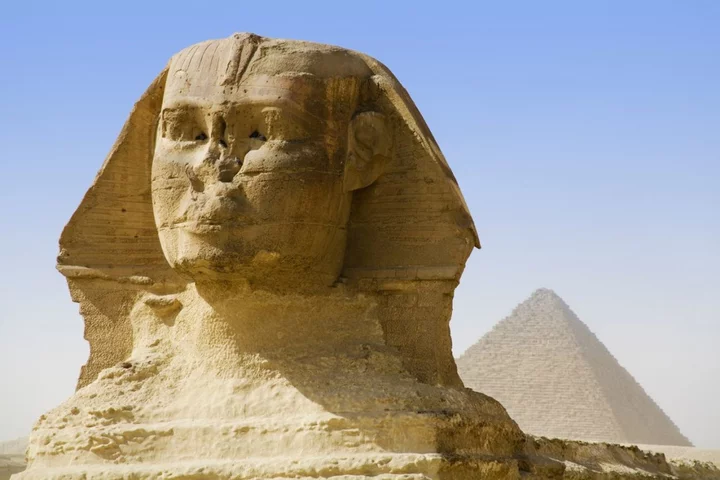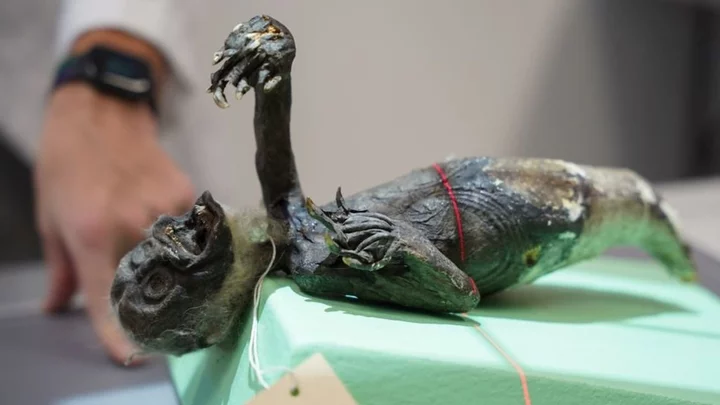
Mass lawsuit against Apple over iPhone batteries can go ahead, London tribunal rules
LONDON Apple Inc on Wednesday lost a bid to block a mass London lawsuit accusing it of hiding
2023-11-01 22:57

China to Invest $2.8 Billion in Zimbabwe in Lithium, Energy
Chinese companies were awarded licenses in the third quarter that could see $2.79 billion of investment flow into
2023-11-01 22:55

SunPower Plunges After Cutting Full-Year Forecast on Demand
SunPower Corp. tumbled after cutting its full-year guidance as earnings fell short of analysts’ expectations on weaker demand
2023-11-01 22:52

Sam Bankman-Fried built 'pyramid of deceit,' jury is told as trial nears end
By Luc Cohen and Jody Godoy NEW YORK (Reuters) -FTX founder Sam Bankman-Fried built the cryptocurrency exchange into a "pyramid
2023-11-01 22:45

King warns of urgent need to ‘combat significant risks of powerful AI’
The King has hailed artificial intelligence (AI) as “one of the greatest technological leaps in the history of human endeavour” but warned of the urgent need to work together to combat its “significant risks”. In a video message for the opening session of the AI Safety Summit at Bletchley Park, the King stressed the need to make sure the technology remained “safe and secure”, and said the speed of its advancement could surpass even human understanding. He likened the “rapid rise of powerful artificial intelligence” to the world’s greatest scientific breakthroughs including the discovery of electricity and the splitting of the atom – and even the harnessing of fire. And he spoke of its potential to “transform life as we know it” for the better, possibly leading to cures for cancer and other diseases, and helping to create green energy. Charles, in footage recorded at Buckingham Palace before he left for his state visit to Kenya, said: “We are witnessing one of the greatest technological leaps in the history of human endeavour. “The rapid rise of powerful artificial intelligence is considered by many of the greatest thinkers of our age to be no less significant, no less important, than the discovery of electricity, the splitting of the atom, the creation of the world wide web, or even the harnessing of fire.” He added: “AI holds the potential to completely transform life as we know it to help us better treat, and perhaps even cure, conditions like cancer, heart disease and Alzheimer’s; to hasten our journey towards net zero and realise a new era of potentially limitless clean, green energy – even just to help us make our everyday lives a bit easier. “However, if we are to realise the untold benefits of AI, then we must work together on combating its significant risks too.” The AI summit sees representatives of nearly 30 countries, including the US, France and China, meeting with leading AI companies and civic society groups to discuss the risks of the emerging technology. Delegates have already agreed on a world-first statement – the “Bletchley declaration on AI safety” – it was announced on Wednesday. The King thanked those attending for laying the foundation for a consensus to ensure “this immensely powerful technology is, indeed, a force for good in this world”. Highlighting the need to keep on top of the technology, the King said: “AI continues to advance with ever greater speed towards models that some predict could surpass human abilities, even human understanding. “There is a clear imperative to ensure that this rapidly evolving technology remains safe and secure.” He said transitions such as AI always presented “profound challenges, especially in preparing for unintended consequences”. But Charles said: “It is incumbent on those with responsibility to meet these challenges: to protect people’s privacy and livelihoods, which are essential to both our economic and psychological well-being, to secure our democracies from harm, and to ensure the benefits of new technology are shared by all.” Describing the international community’s co-operation on climate change, the King added: “We must similarly address the risks presented by AI with a sense of urgency, unity and collective strength.” Read More Kamala Harris arrives in the UK ahead of AI safety summit Study finds ‘deepfakes’ from Ukraine war undermining trust in conflict footage More than 500 potential cyber attacks logged every second, BT says AI being used to create child abuse imagery, watchdog warns ChatGPT and other chatbots ‘can be tricked into making code for cyber attacks’ Tinder adds Matchmaker feature to let friends recommend potential dates
2023-11-01 21:55

New York, New Jersey Offshore Wind Farms Imperiled by Writedowns
The crisis engulfing the US offshore wind industry escalated as Orsted A/S and BP Plc became the latest
2023-11-01 21:50

Storm Ciaran Set to Batter UK and France With Violent Winds
The UK and western France are bracing for the impact of Storm Ciaran, which is set to hit
2023-11-01 21:21

Scientists make key discovery about mysterious origins of Egypt’s Great Sphinx
The feats achieved by the Ancient Egyptians have long flummoxed even the most renowned experts. For example, how on earth did they build the Great Pyramid of Giza? It’s taken centuries for scientists and archaeologists to come up with an answer, and even that’s not set in stone. But now, researchers believe they’ve finally worked out how the Great Sphinx was made more than 4,500 years ago. Sure, there’s a pretty broad consensus about how the face of the giant limestone statue was created – it was most likely hand-carved by stone masons. But the imposing, multi-layered body had continued to evade explanation. However, researchers at New York University, have finally concluded that the body came about. And it wasn’t all thanks to the masonry skills of local workers. They believe that the shape was sculpted by Mother Nature herself, in the form wind. “Our findings offer a possible ‘origin story’ for how Sphinx-like formations can come about from erosion,” Leif Ristroph, senior author of the study, said in a statement. “Our laboratory experiments showed that surprisingly Sphinx-like shapes can, in fact, come from materials being eroded by fast flows.” For their study, the team took harder rock encased in mounds of soft clay to mimic the terrain along the Nile River in northeastern Egypt. They then washed over these formations with a fast-flowing stream of water to replicate the wind and, in the end, the clay assumed a Sphinx-like shape. The resulting form consisted of a lion’s “head,” “neck,” “paws” laid out in front and an arched “back". “There are, in fact, yardangs (rock features formed by air erosion) in existence today that look like seated or lying animals, lending support to our conclusions,” Ristroph pointed out. Still, we’re sure Ristroph would be the first to admit that he and his colleagues weren’t the first to come up with the aeolian erosion theory. In 1981, geologist Farouk El-Baz suggested that the iconic Sphinx was originally a flat-topped shape that was worn down by wind over time. Furthermore, El-Baz believed that the builders of Ancient Egypt would have known of these natural processes, and so carefully selected the shapes of their most iconic structures to withstand them. "Today, the pyramids of Giza exist in perfect harmony with their windy environment," the scientist said back in 2001. "Had the ancients built their monuments in the shape of a cube, a rectangle, or even a stadium, they would have been erased by the ravages of wind erosion long ago." Nevertheless, the New York University team were the first to show exactly how this phenomenon could have occurred, and their findings have broader implications. "The work may also be useful to geologists as it reveals factors that affect rock formations—namely, that they are not homogeneous or uniform in composition,” Ristroph said. "The unexpected shapes come from how the flows are diverted around the harder or less-erodible parts." Sign up for our free Indy100 weekly newsletter Have your say in our news democracy. Click the upvote icon at the top of the page to help raise this article through the indy100 rankings
2023-11-01 20:25

‘Mermaid mummy’ from Japan found to be a Frankenstein's mix of body parts
Frankenstein’s monsters aren’t just for Halloween, as a team of US scientists have recently discovered. The experts at Northern Kentucky University (NKU) were tasked with analysing the remains of a supposed mummified “mermaid”, and what they found was pretty gruesome. The mummy was brought to America from Japan more than 100 years ago after being donated it to the Clark County Historical Society in Springfield, Ohio. It arrived at the society in 1906 but documents supplied alongside the strange specimen suggest it dates back to the mid-1800s. This means that for some 170 years, the true identity of the wisened, 29-cm-long creature remained a mystery. However, thanks to modern technology, the team at NKU has finally worked out that the sinister-looking “siren” is, in fact, a ghoulish hybrid of monkey, fish and lizard. Joseph Cress, who led the project, told Live Science that he and his colleagues used X-ray and CT scans to investigate the creepy cadaver. "This allowed us to see [the mummy] in almost every dimension in the hopes to see what was inside it," he explained. They determined that that the “mermaid” consists of the head and torso of a monkey sewed onto the body of a fish, and its “hands” are the clawed legs of a lizard – most likely a Komodo dragon. The scans also revealed a pair of wooden stakes hidden inside the chimeric corpse – one running from head to tail and another across the shoulder blades — which were presumably inserted to keep the monster in one piece. Cress and his colleagues are currently trying to reconstruct a more detailed model of the mermaid and its individual components, according to Live Science. Once these models are complete, they plan to send them to zoos and aquariums to help confirm the different parts on a species level. However, jaw-dropping this specimen may be, it's not the only “mermaid” to be debunked in recent times. In March 2022, researchers analysed a similar example that was found in a hidden box in a Japanese temple. They also expected the creature, which was 30.5 cm long and dated back to the mid-1700s, to be a monkey-fish hybrid. However, tests conducted in February this year revealed that it was, in fact, predominantly made of cloth, paper and cotton. It had been painted with sand and charcoal and held together by metal pins, while various animal parts, including fish skin and mammal hair, had been stuck to it. Experts believe that the two “mermaids” were made to resemble "ningyo" — hideous fish-like creatures with human heads and sharp claws from Japanese mythology. According to legend, a nun named Yaobikuni lived for 800 years and retained the youthful appearance of a young woman, after eating a ningyo. Her immortality made the creatures a symbol of longevity, so it’s likely that fraudsters tried to recreate the mermaids to sell them to wealthy seekers of immortality. Still, at least the owners of these two examples didn’t make the mistake of trying to eat them. Sign up for our free Indy100 weekly newsletter Have your say in our news democracy. Click the upvote icon at the top of the page to help raise this article through the indy100 rankings
2023-11-01 19:28

Facebook owner faces EU ban on targeted advertising, Norway says
By Gwladys Fouche OSLO The European data regulator has agreed to extend a ban on "behavioural advertising" on
2023-11-01 19:19

Deep in Trump Country, Biden Plan Creates Hundreds of Green Jobs
The papermill in Courtland is gone. The railcar factory in Cherokee too. Here in north Alabama, people are
2023-11-01 18:46

US House panel seeks ban on federal purchases of Chinese drones - FT
The U.S. House of Representatives' China committee will introduce a bill to ban the U.S. government from buying
2023-11-01 18:26
